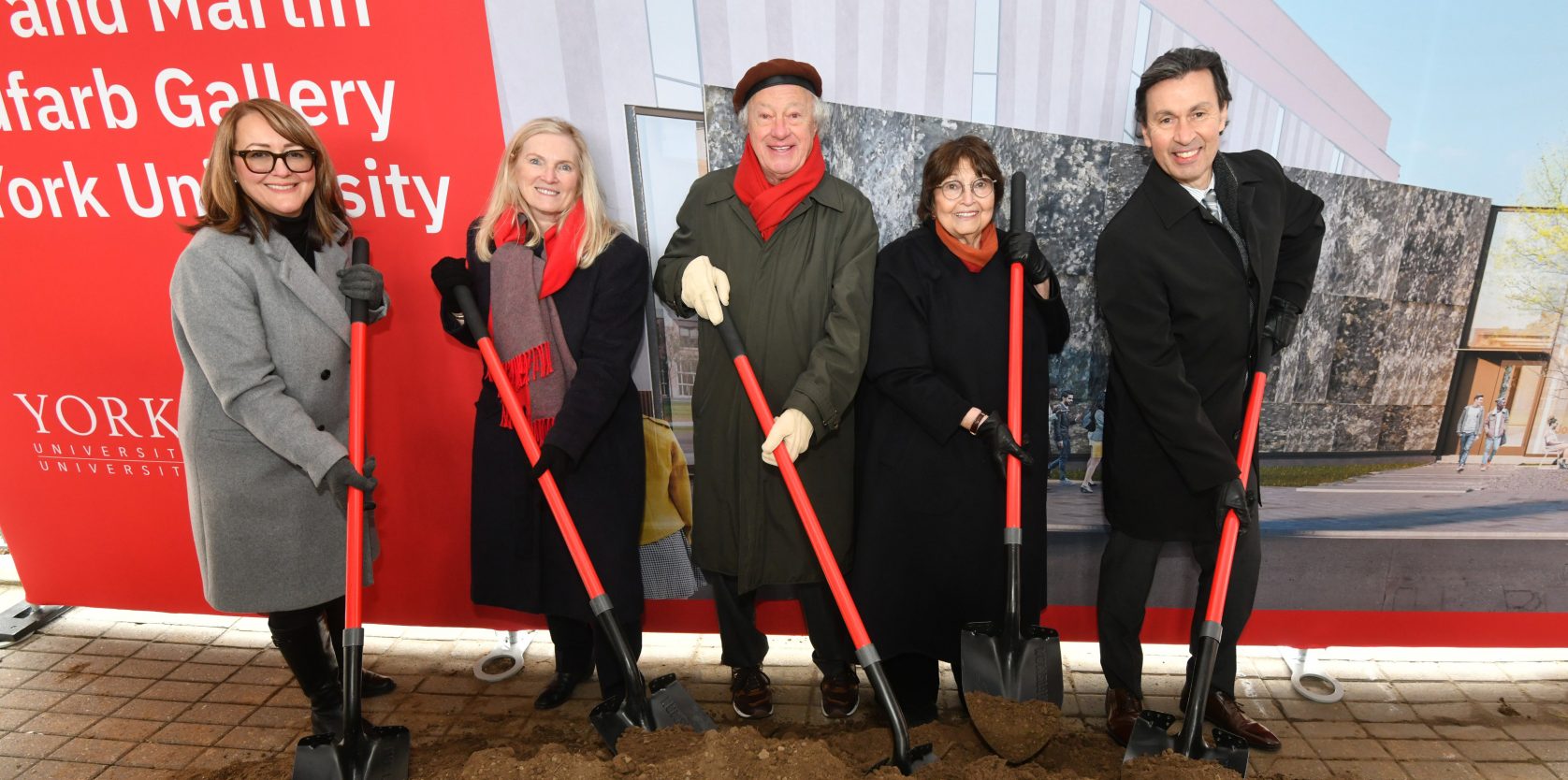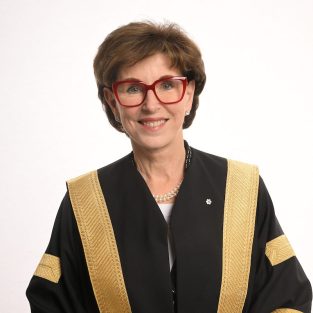We are expanding our collaborations with leading partners in the public, private and non-profit sectors to tackle society’s most pressing issues and provide valuable learning opportunities for our students.
As co-hosts of the 2023 Congress of the Humanities and Social Sciences, we served as a nexus for critical conversations on decolonization, equity, diversity and inclusion. We signed transformative MOUs with local and international governments as we work to advance the SDGs and launched a new Water Academy in partnership with UNITAR and others.
As we move forward, we will continue to facilitate cross-sector collaboration and conversation that stimulates equitable economic prosperity, sustainable development and long-term success.
By the Numbers
- $500M
- funds raised for York’s Impact Campaign
- $34540538
- annual funds raised in 2023

Advancing York’s leadership in sustainability
A new CSO, a Microlecture Series and bold promises to achieve net zero sooner
In the past year, York has made remarkable progress towards achieving its sustainability goals, enhancing its position as a leader in sustainability, and its commitment to creating a better future for the planet.
The University is ahead of targets established in the Sustainability Framework, which included a goal to reduce indirect and direct emissions by 45 per cent by 2030 to achieve net-zero sooner and has made significant progress in reducing its fossil fuel investments through its Environmental, Social and Governance (ESG) approach.
The University also hired its first Chief Sustainability Officer, Mike Layton, and has committed $1 million to support Sustainable Innovation.
To enhance sustainability on campus, 33 electric vehicle recharging stations have been installed at the Keele and Glendon Campuses, as well as an expanded Toronto Bike Share program, which is building York’s on-campus cycling infrastructure. The University also leads the way in waste diversion on campus, having achieved greater diversion rates than surrounding municipalities.
In March 2023, York also launched the Microlectures Series in Sustainable Living – a series of six videos from renowned York faculty on a diverse range of topics related to sustainability. More than 200 participants have earned their digital badge on Sustainable Living to date.
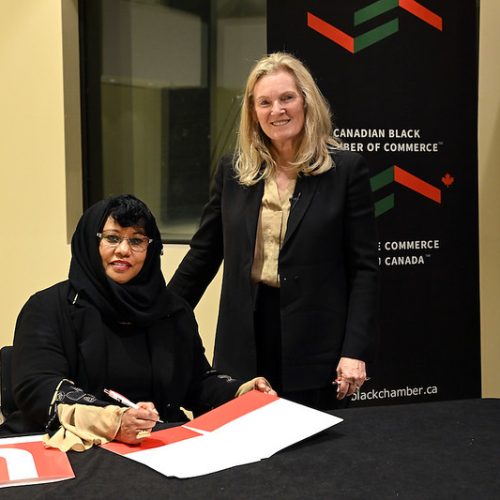
Boosting economic growth through equitable procurement
York University partners with the Canadian Black Chamber of Commerce on social procurement MOU
In March 2023, York University and the Canadian Black Chamber of Commerce (CBCC) signed a Memorandum of Understanding (MOU) that aims to reduce barriers to commerce and drive inclusive economic growth.
At the heart of the collaboration between York University and the CBCC is York’s Social Procurement Vendor Portal, an innovative framework to change how the University buys goods and services. It is designed to support diverse-owned businesses and social enterprises in Ontario’s local communities. The Portal and York’s Social Procurement Policy solidify York’s commitment to prioritizing vendor diversity.
CBCC members will be able to fast-track their applications through the portal, which will provide meaningful support to Black-owned businesses.
Through proactive identification and collaboration with diverse-owned businesses, social enterprises and individuals who face higher unemployment, underemployment and discrimination, this partnership is helping York and the CBCC realize their shared vision of a future marked by equitable social development, inclusive economic recovery, community capacity building and social justice.
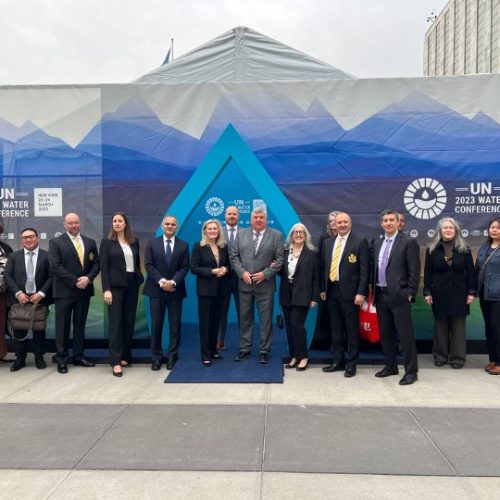
Addressing the water crisis
York partners with the United Nations to launch a Global Water Academy
In partnership with UNITAR and others, York launched a Global Water Academy to tackle diverse aspects of the water sustainability crisis – a key action supporting York’s goals to advance the United Nations Sustainable Development Goals and building on York’s rich research expertise in water and sustainability.
Launched in March 2023 at the United Nations Water Conference, the first conference on water in 50 years, the Global Water Academy brings academic and private sector partners together to develop scientific-based water solutions that will inform international water policies and programs, and promote knowledge transfer and capacity building, especially in distressed areas and for Indigenous communities and equity-deserving groups.
“The water crisis is a global equity issue that disproportionately impacts racialized, low-income, and other marginalized communities,” said President and Vice-Chancellor Rhonda Lenton to a delegation at the United Nations headquarters in New York City. “By working together with UNITAR and as the academic lead on a new Water Academy, York University is demonstrating the important role of higher education in addressing these issues and advancing Sustainable Development Goals through scholarship and activism.”
New research expansion project set to transform global health
York University’s expanded Sherman Health Sciences Research Centre will boost research and experiential education opportunities for students and faculty
A revolutionary new Neuroscience Laboratory and Research Building began construction in August 2022 – the work is part of plans to expand the current Sherman Health Sciences Research Centre by adding a 52,000 square-foot, two-story structure which will foster interdisciplinary research opportunities and provide students with more experiential learning.
The Centre, which opened in 2010, thanks to the generosity of philanthropists Barry and Honey Sherman, is a world-class hub for interdisciplinary research with a focus on biomedicine, brain function, vision, robotics and virtual reality.
The new building is funded in part by the Canada Foundation for Innovation. It will act as a focal point for neuroscientists across the world and a driver of cutting-edge research that serves all from victims of traumatic brain injuries and athletes with sport concussions to homeless individuals with clinical conditions.
The Centre will advance York’s commitment to interdisciplinary research, sustainability, creating a positive community impact, education and the discovery of innovative solutions for healthier, safer and more productive lives.
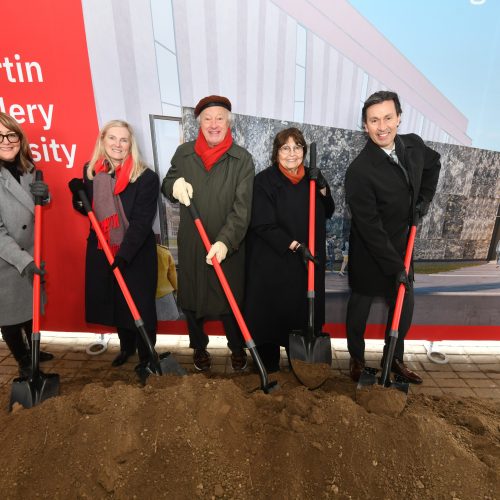
Bringing community together through art
Transformative Joan and Martin Goldfarb Gallery of York University set to open in June 2024
The Joan and Martin Goldfarb Gallery of York University (GGYU) will usher in a new era for the arts at York University and York Region.
The GGYU has been made possible thanks to a generous $6 million donation from long-time York University supporters, Joan and Martin Goldfarb, who donated $5 million in 2019 to establish the gallery, and an additional $1 million gift at the official groundbreaking ceremony in November 2022.
Led by award-winning international architectural firm Hariri Pontarini, this visionary new building will act as a focal point for the York and Greater Toronto Area art communities. It will enhance access to and expand student learning and research collaboration opportunities for AMPD and other York faculties. The gallery will also engage in critical work to build ties with diverse local and global artists and arts organizations. It will provide an inclusive and welcoming space for students, staff, faculty and the community to imagine and be inspired.
With renowned curator Jenifer Papararo at the helm, the GGYU will invigorate the University’s collection, enhance support and mentorship to artists, and create opportunities for engagement and dialogue.
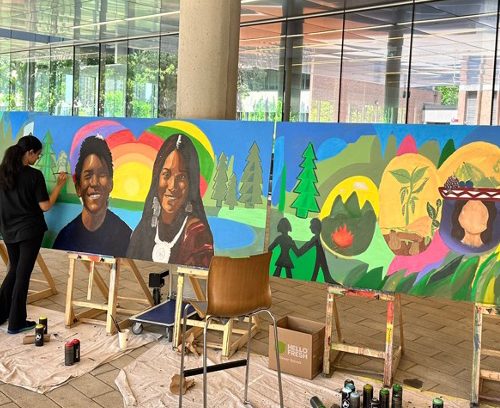
Examining “Reckonings & Re-Imaginings” at Congress
York successfully organizes the 2023 Congress of the Humanities and Social Sciences
In May 2023, York University hosted Congress of the Humanities and Social Sciences, Canada’s largest academic gathering, in partnership with the Federation for the Humanities and Social Sciences. More than 10,000 participants assembled on York’s Keele Campus to explore the theme “Reckonings and Re-imaginings.”
This theme underscored the urgency of recognizing historical injustices and the intersectionality of race, gender, Indigenous and geopolitical issues; and leveraging this knowledge to dismantle systemic inequities. With the support of 67 participating academic associations and more than 250 York-based faculty and scholars who hosted over 200 talks, it created a transformative space where Indigenous and Black scholars and artists could influence the disciplines of humanities and social sciences while making a tangible impact on the SDGs.
Approximately 160 York-led open programming events took place throughout the conference, ranging from scholarly presentations, panels and workshops to film screenings, exhibitions and tours. Poetry readings were also presented by high school students from the nearby Jane-Finch community. Congress 2023’s success was facilitated by nearly 900 staff members and over 400 volunteers, who helped demonstrate York’s leadership in building a brighter, more equitable future in line with its University Academic Plan 2020–2025.
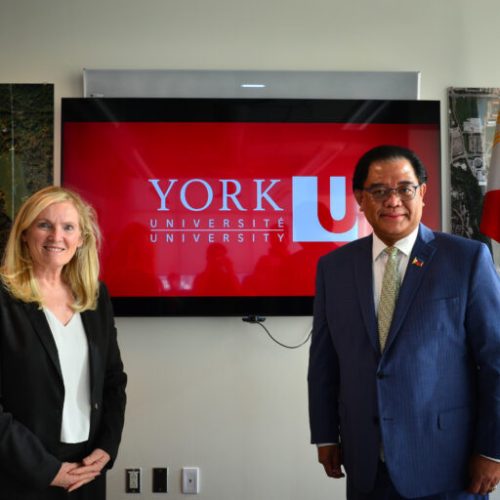
Building ties between Canada and the Philippines
Historic donation will enhance academic and research collaborations and promote Filipiniana culture
A historic donation agreement between York University and the Philippine government will enhance academic and research collaborations between the Philippines and Canada related to Filipino history, cultures and society, particularly through the York Centre for Asian Research.
The $115,000 CAD gift is the first time the Philippine government has provided direct funding of this kind to a Canadian University. It will support York University in promoting Philippine Studies through initiatives that include showcasing the work of Philippine academics and researchers based in the Philippines and in Canada; enhancing York’s Filipiniana collection, including the purchase of books, journals and other publications; establishing grants and students prizes to advance student degrees related to the Philippines; and, advancing research and scholarship related to Filipino history, culture, languages and politics, as well as Filipino-Canadian relations.
Advancing the SDGs through transformative partnership
York University renews its partnership with UNITAR, the Regional Municipality of York and York Regional Police
In March 2023, York University renewed its transformative partnership with UNITAR, the Regional Municipality of York and York Regional Police, which aims to deliver joint training and professional development activities targeting government officials, leaders, civil society and other interested parties in support of the SDGs. The renewed MOU was signed at the United Nations Water Conference, which took place in New York City.
The thematic areas for collaboration and exploration in this renewed MOU include social determinants of health, mental health and well-being, anti-racism and inclusionary practices and climate change, disaster and risk management, among others.
Under the first MOU, York University established CIFAL York, the first CIFAL Centre in Canada, which launched in June 2021. CIFAL York is a world-class training hub that brings together academics, practitioners and government leaders to share knowledge and foster solutions to complex, global problems.
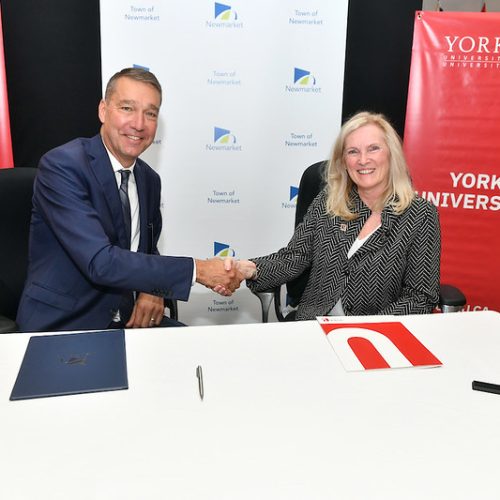
Designing sustainable programs for municipalities
York University partners with the Town of Newmarket to realize sustainable future
In September 2022, York University and the Town of Newmarket partnered to realize their shared vision of creating healthy and prosperous communities.
The five-year partnership aims to bolster education, professional development and research in ways that improve lives, institutions and environmental sustainability. As part of this initiative, York University will take the lead in hosting and designing innovative programs tailored for Newmarket, which include community and executive education initiatives. In return, the Town will provide experiential learning opportunities for York students in key areas such as Public Policy Administration and Law, Urban Planning, Environmental Studies, Law, Glendon Interpretation Program, Engineering and Technology.
The collaboration also endeavours to generate evidence that informs the Town’s policies in areas such as technological advancement, transportation, sustainability, and equity, diversity, and inclusion; and create a model for collective action that will inspire other communities to work towards a sustainable and prosperous future.
